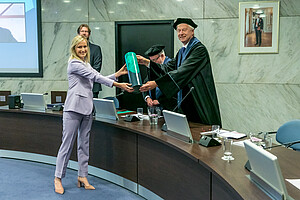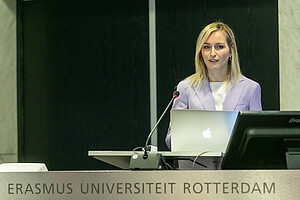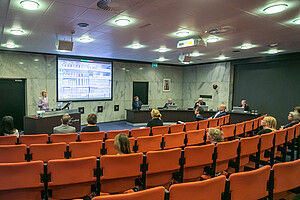PhD Defence Linda Couwenberg

In her dissertation 'Context Dependent Valuation. A neuroscientific perspective on consumer decision-making’, Linda Couwenberg takes an interdisciplinary approach to study how different types of contextual information can increase the desirability of anticipated outcomes and thereby influence common, everyday, consumer behaviors. Linda Couwenberg defended her dissertation on Thursday, 24 September 2020 at 15:30h. Her supervisors were Prof. Ale Smidts (EUR), Prof. Alan Sanfey (Radboud University), and Dr Maarten Boksem (EUR). Other members of the Doctoral Committee are Prof. Stefano Puntoni (EUR), Dr Bram van den Berg (EUR), Prof. Eveline Crone (EUR), Dr Nynke van der Laan (Tilburg University), and Dr Mathias Pessiglione (Sorbonne University).
About Linda Couwenberg

Linda Couwenberg obtained her Bachelor of Science (2010) and Master of Science (2012, cum laude) in Psychology from Leiden University. In 2012, she started her PhD in Consumer Behavior and Decision Neuroscience under the supervision of Prof. Ale Smidts and Dr Maarten Boksem at the Rotterdam School of Management, Erasmus University. The interdisciplinary nature of her research involved supervision by Prof. Alan Sanfey at the Donders Institute for Brain, Cognition and Behaviour. Her doctoral research has been published in the International Journal of Research in Marketing and Frontiers in Neuroscience, and has been featured in (inter)national media. She has presented her work at numerous academic conferences (including the annual meetings of the Society for Neuroeconomics, the Association for Consumer Research and the Society for Consumer Psychology). In 2016, Linda was a visiting research scholar at Stanford Graduate School of Business. Since October 2018, she works as a Behavioral Scientist at Google in London.
Thesis Abstract

People often use contextual information as reference points to determine the desirability of an outcome. These contextual cues can strongly impact our attitudes and behavior toward an outcome, even if this information is not directly related to the outcome itself. This dissertation takes an interdisciplinary approach to study how different types of contextual information can increase the desirability of anticipated outcomes and thereby influence common, everyday, (consumer) behaviors. As measuring implicit decision-making processes can be challenging, neuroscientific methodology can provide valuable insights. Across three empirical chapters, this research examines how the brain evaluates contextual information prior to deciding on a subsequent course of action, by combining theory and methodology from consumer behavior and neuroscience. Specifically, behavioral tasks are combined with functional magnetic resonance imaging (fMRI) methodology to study the neural processes underlying goal-directed behavior, the neural mechanisms of variety seeking in a consumer choice context, and the neural responses to ad appeals. This dissertation demonstrates how an interdisciplinary research approach can facilitate theory development and shape models of consumer decision-making. Ideas for the application of insights to marketing, user experience design, and public policy are discussed.
View photos of Linda's defence
Photos: Chris Gorzeman / Capital Images

